
the GLOW UP MAGAZINE THE JOHNS HOPKINS NEWS-LETTER PRESENTS December
2022 Say goodbye to toxicity and hello to self love
1,
Dear readers,
We understand that “glowing up” is a fraught, complicated issue. From childhood tales of the ugly duckling to before-and-after posts on Instagram, it’s hard not to feel overwhelmed with the message that you need to change. Or that this change must be visible and desirable to others.
In choosing this topic for our magazine, it might seem like we’re only perpetuating such harmful ideas. Our intention, however, is to gather a variety of perspectives that reconceptualize and subvert what it means to glow up, from practicing self-care through meditation and journaling to questioning our obsessions with makeovers and glowing up.
Ultimately, the best kind of personal change is any change that makes you happy. You — past, present and future — are valid. Don’t let anybody tell you otherwise.
Sophia Park and Isabel Thomas Magazine Editors ’22 – 23
Letter from the Editors Table of Contents
3 5 7 2 4 6 8 Letter from the Editors + Table of Contents Meditation 101 Five books hot girls working on themselves read Making your living space feel like home Making space for yourself Take a plant break 10 12 14 9 11 13 15
2
Why are we obsessed with makeovers Tips to kickstart or revitalize your journal Your pathological niceness, your blood-boiling, vessel-rupturing anger The importance of getting a good night’s sleep How to step up your skincare game The dark side to glowing up A special thank you to Judy Jeong, Ashley Kim and Sophia Park for contributing photos to this magazine. Photos on the cover and back pages were taken at good neighbor.
MEDITATION 101
Helen Lacey, News & Features Editor ’22-23
This past year, I’ve found that even on days when I feel like I have no spare time, I still need to make time to take care of myself; in fact, it’s especially important that I practice self-care on those days. Meditation has become one of my favorite ways to relax and reenergize for multiple reasons, but the biggest one is that it’s simple. Sometimes I just don’t have the energy to go for a run, to journal or to do a complicated skincare routine. Sometimes all I want to do is close my eyes and rest for 10 minutes, and oftentimes that’s enough to help me unwind.
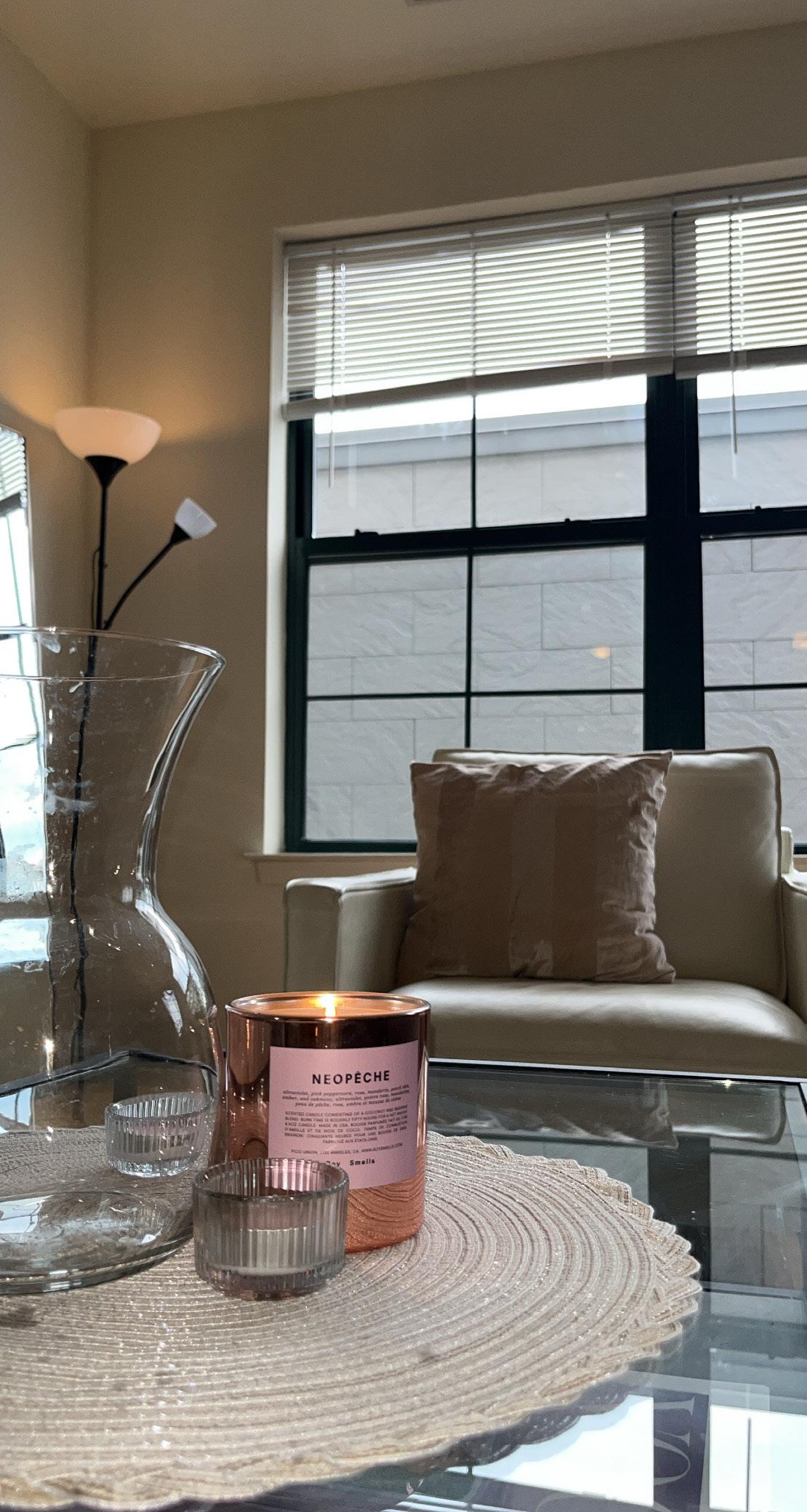
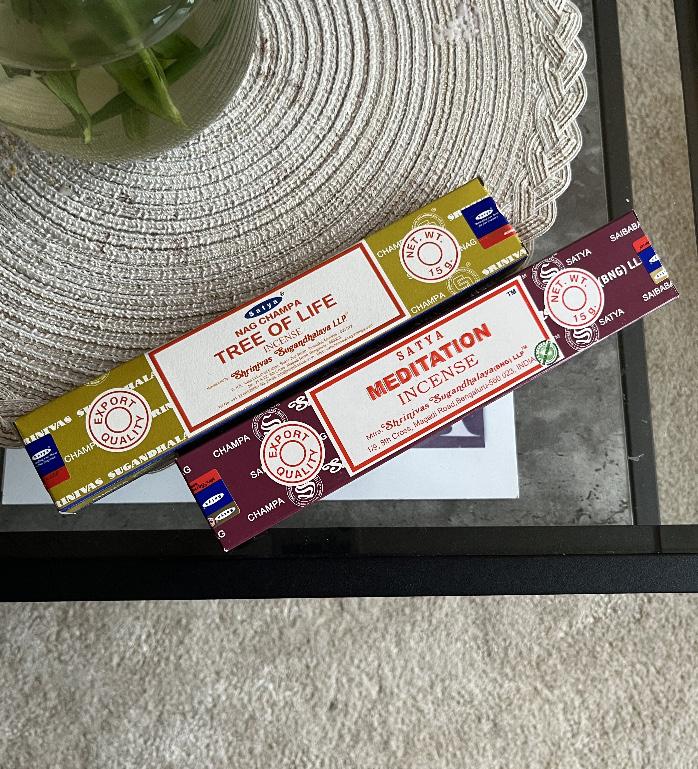
meditation, and each time I tried I couldn’t help but feel like I was “doing it wrong.” Below, I’ve created a non-exhaustive list of some of my favorite forms of meditation and meditation resources that helped me better understand the practice.
Calm app
people take advantage of it. The app personalizes your meditation sessions for your reduce stress and for night owls who are hoping to get better sleep. I really enjoy the guided yourself to see which meditation form best suits you!
Metta meditation
One form of meditation I enjoy practicing is metta meditation, also known as others. Performing this meditation makes me feel more at ease and less pessimistic.
Transcendental meditation
The Hopkins Transcendental Meditation (TM) program helped me begin meditating. learning experience to undergraduate and graduate students for free. TM has a lot of hype surrounding it, with celebrities like Oprah Winfrey and David Lynch touting morning and evening.
meditation and also comes with a high price tag for most participants. While I still out of the program early for a variety of reasons), the program was a great way to get introduced to meditation because of its cohort-based approach. I can’t say I would have reliably meditated for 40 minutes a day for a month had it not been for the regular check-ins with my instructor. While some aspects of the program might be strange, I’d still recommend Hopkins students to check it out for themselves if they want to learn more about meditation.
3
Five books hot girls working on themselves read
Ellie Rose Mattoon, SciTech Editor ’22-23
Grab your tote bags and head down to Bird in Hand for an iced oat chai, because it’s time to sit down for some reading. No, not the desert-dry PDF scan your professor uploaded captions that make you feel horrible about yourself don’t count either. When is the last time you sat down to a book that felt like it fed your soul? A book that inspired you to be the
Anxious People by Fredrik Backman
books on audio. And if you saw me laughing
listening to Anxious People . Fredrik Backman is a genius at creating feel-good stories, and if you end up enjoying Anxious People that you check out some of his other works as well.
Mindset: The New Psychology of Success by Carol Dweck
book aesthetic, but this book truly made a
roundup of some of the books that have made me feel like an empowered main character by
Anxious People , an apartment viewing turns into a proto-hostage situation as a bank robber
eight hostages is quite pathetic at being stereotypical hostages, and each of them enters the situation with a hefty amount of baggage. And while
could get my hands on his copy of The Hunger Games back in middle school.
listening to it on audio while pipetting wells at Hopkins who feels like an impostor or some sort of “failure” for not measuring up to out side expectations.
The Midnight Library feels like a modern-day a young woman, gets the opportunity to visit a place between life and death called “The something she could have been if she had swimming for longer, would she have ended up an Olympic athlete? Or could she end up escaping her hometown and becoming a glaciologist in the Arctic? While not giving away the ending, let’s just say that Nora slowly tears
yourself in tears. All in all, it’s a great reminder to be kinder to others and to ourselves.
The Little Prince by Antoine de Saint-Exupéry
Don’t let the fact that this book is in the children’s section of the library deceive you. This book may be a quick read, but it’s not for those without a heart.
Though the story follows a space prince and his travels from planet to planet, it feels vaguely who, at one point, found himself stranded in the he ultimately disappeared while performing a reconnaissance mission for the allies during The Little Prince itself follows a pilot who also
examples, the main point of Mindset is that everyone is capable of change — with the proper mindset. For anyone about to give up on their math homework or change the major they love because they are just not good at it, Dweck reminds us that grit and growth are the keys to success, regardless of the abilities one is born with.
Meditations by Marcus Aurelius
this book to me during college application season,
beyond novels and delve into an “academia vibe,” this book is a good choice.
turns out that the place was never so far away after all. Ultimately the book serves as a helpful reminder of honoring the things we can’t control and being grateful for what we have.
who claims to have come from a distant planet he has all to himself. The prince’s mysterious stories of his planetary travels and the characters he meets along the way will sound familiar to anyone who is trying too hard to be an adult right now. And an added plus: This book is
Meditations is essentially a collection of journal entries from the Roman emperor Marcus known as a philosopher of stoicism, a school and the development of knowledge and virtue. Given that Aurelius never intended to publish Meditations , the book is not outstandingly structured, but that means it is easy to pick up and put down for long stretches of time. This book encouraged me to live free of worry or fear for the future and instead to craft the best life that
The Midnight Library by Matt Haig
4
Making your living space feel like home
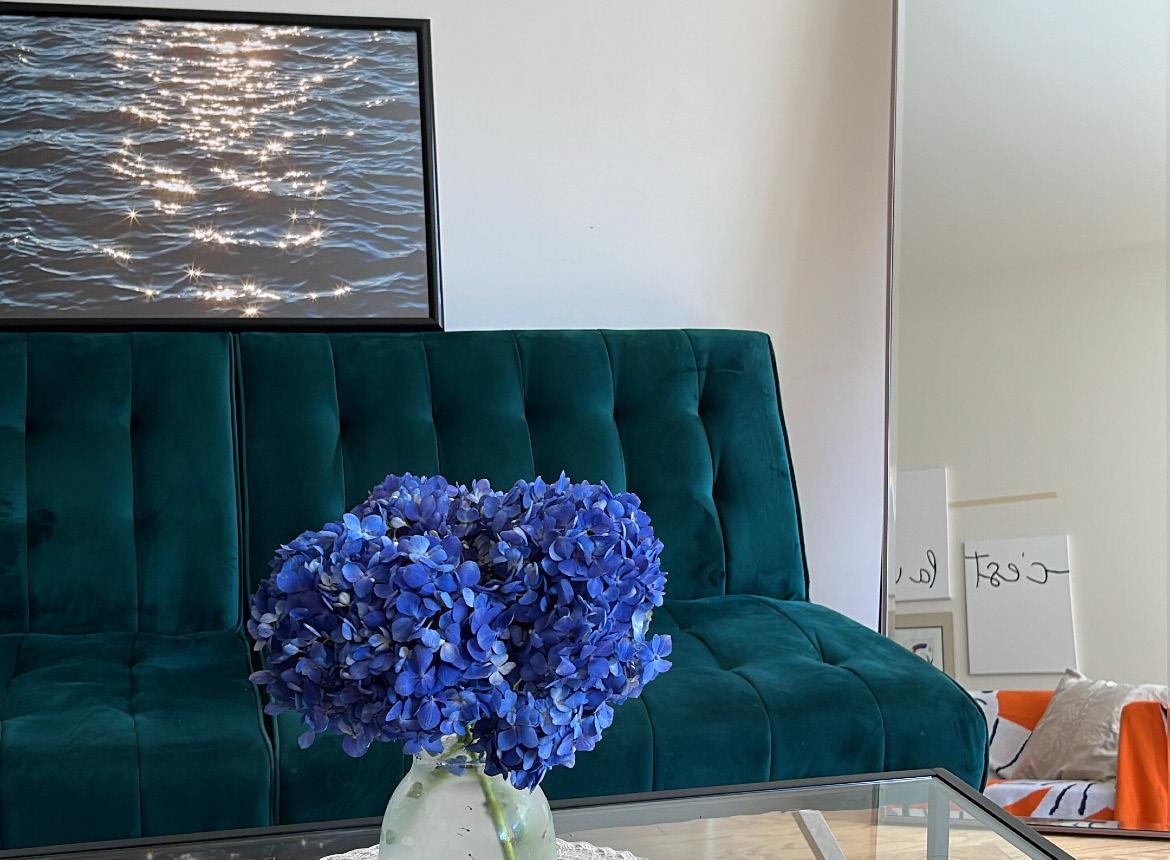 Maria Harar
Maria Harar
As a core experience of college life, decorating daunting. priority for some, the most important thing space to call home. To ease some of the
Maintaining a healthy environment
Finding inspiration
This one’s for all of my Pinterest enthusiasts.
A dorm that is easy to clean is a dorm that is easy to maintain, an essential aspect for the hefty toll on your mental health. Maintaining control. But if you do happen to come home to a messy dorm one day, don’t stress. Play
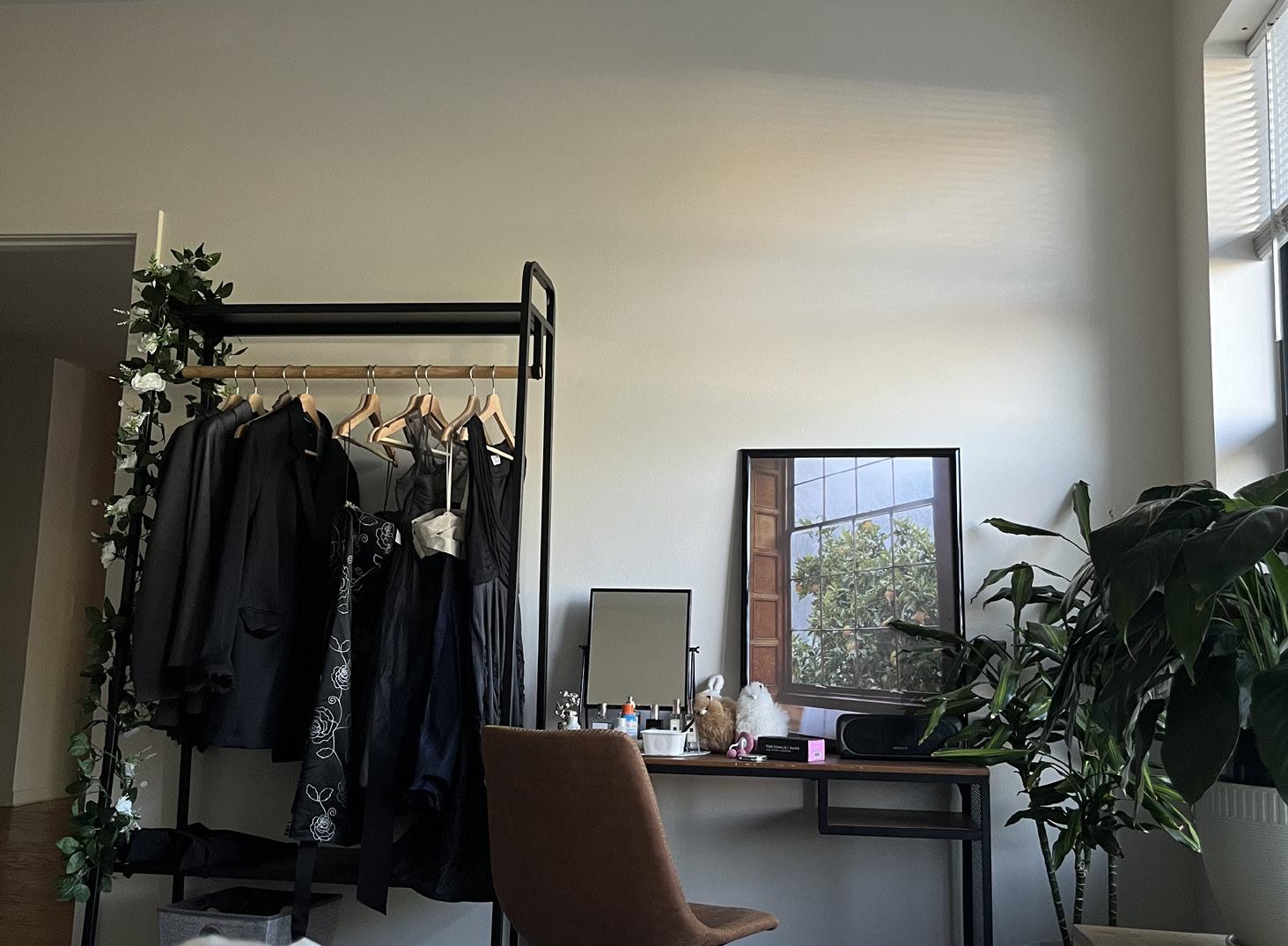
Good vibes make a good home
disappointment from a rough day into your until you are once again ready to face it.
Bringing home to Hopkins
5
Making space for yourself
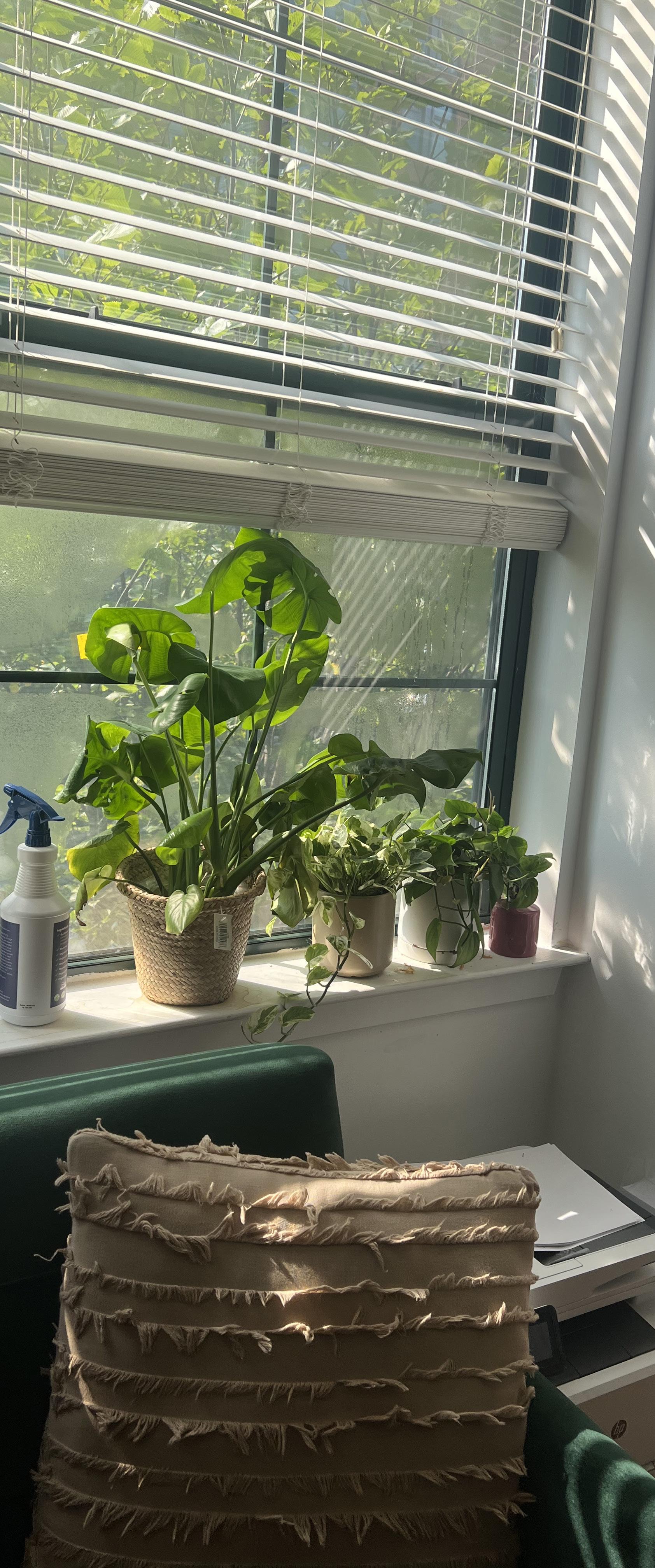 Niva Savani
Niva Savani
Taking time for yourself is highly recommended to integrate into your daily routine. These moments help us process our thoughts, emotions and surroundings, allowing our brain to take on the needed break from stress. Whether you spend one hour or 15 minutes, this time will help
A misconception is that this is a “waste of time” and that there are many is always going to be a lot going on in your life such as academics, work, chores or keeping up with friends. You are allowed to show yourself
A step forward in taking care of yourself is practicing the act of mindfulness. According to an article from Mindful, “Mindfulness is the basic human ability to be fully present, aware of where we are and what we’re do us.”
ability to relax, a greater enthusiasm for life and more self-esteem.
The real question is how do you actually perform the act of mindfulness?
A basic technique for centering yourself if you are in a hurry is just practice mindful yoga. The purpose of yoga is to unite our bodies and mind. present moment. This is the “mindfulness” part of yoga. When our mind classes as the pandemic caused us to turn to working out at home. We
Lastly, the use of saying the word “om” is one of the most recognizable parts of yoga. Traditionally this is said as you let your breath out as a way to hear only your thoughts instead of the outside world. I encourage you
6
Self-con dence: stan yourself
Isabel Veloso
Before we begin, the noun “stan” is “an extremely or excessively devoted fan” (definition from Merriam-Webster). To stan someone or something is “to exhibit fandom to an extreme or excessive degree” (Merriam-Webster again).
I would also like to note that a majority of “stan Twitter” language comes from African American Vernacular English (AAVE) and the LGBTQ community (example: the phrase “she ate”). I have tried to use terms that are not appropriated from these spaces, but if there are any, I want to acknowledge the
This sort of self-dialogue went unnoticed for a while, but I really the summer when I could have been relaxing or working as an “incoming summer analyst” (whatever that means). Instead, I read the Kaplan books page to page, memorized amino acids and went through as many practice questions as I could muster. It’s very easy to fall under the
in mainstream media by calling it “Gen Z language,” but appropriating this language takes away the meaning from real people and cultures.
Stan Twitter is one of my greatest sources of entertainment. I love the sheer over-the-topness of fandoms, the way people put so much emotion into calling their faves “my poor meow meow,” claiming that these faves “outsold” or invented the music industry. I have seen threads dedicated to a K-Pop idol’s neck muscle. We as stans (I admit I am one things in truly the most unnecessary ways.
I don’t want to condone glorifying any human being outright, but I’ve honestly learned a little bit from how stans tweet about their faves. The lingo has invaded my mind: echoes of “HIS DUALITY!” or “she was so insane for this” play through my head. Let me list a few more examples of direct quotes from stan Twitter:
“loving [insert celebrity] isn’t just a hobby, it’s a lifestyle, a reason to breathe, an escape from this cruel world filled with thieves. it’s art, the first gift you open on xmas, a hug from a loved one, it’s everything you’ve ever wanted. it’s everything you need”
“could your fave ever? NO, your fave could never”
This is when I began to consciously hype myself up. Whether it was before my own fangirl and compliment myself for the little wins. It didn’t matter whether I believed it or not, at least I could say it and put that sentiment out there.
Hopkins, where imposter syndrome is more common than anyone realizes. could ever” and truly believe it can help a lot if thought spirals cause you to compare yourself to others.
What is difficult about self-confidence (among other things) is that so much of it is on us as individuals to change our mindset. It’s a lot easier to feel good about yourself when there is someone else complimenting you and validating your feelings, but that isn’t really sustainable in the long run.
“truly the best thing my eyes could ever see”
After years of seeing these phrases online, I started saying these
the kind of person who has an internal monologue at all times, so if I made scrambled eggs correctly, I would say something like “maybe I’m a domestic goddess” in my head. If I got a physics problem right, I would (silently) claim that I had invented physics.
For me, some positive self-talk recommendations also seemed forced, but framing it as “I’m stanning myself” made it easier and a little things, and it makes my life a bit more fun to direct attention I might have
7
Take a plant break
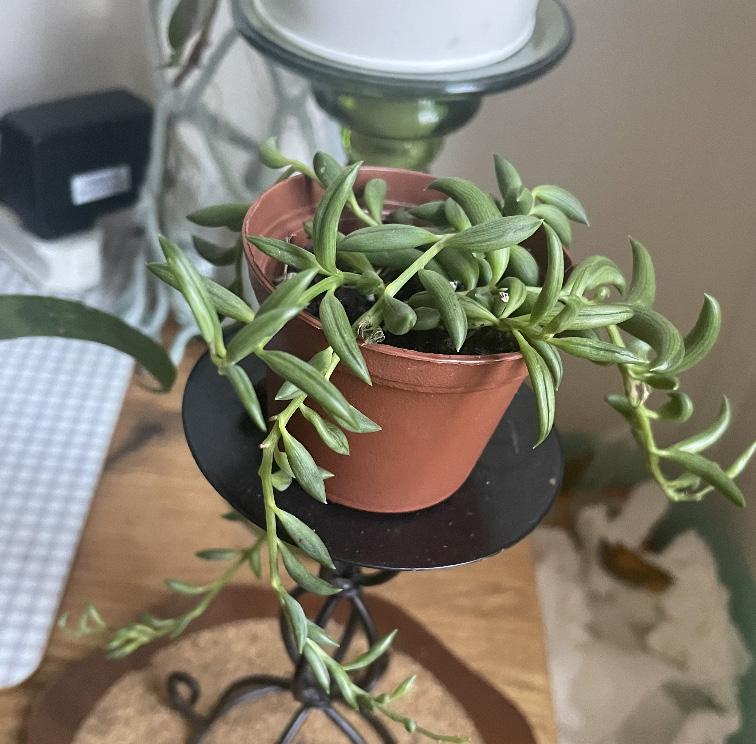



Looking to become a
Check out
at www.jhunewsletter.com 8
Photos courtesy of Laura Wadsten
plant parent?
Wadsten’s article
Why are we obsessed with makeovers?
Emi Gonzalez
Growing up as a girl, I quickly became accustomed to makeovers. Playing dress-up was a favorite pastime; I could become Cinderella or Rapunzel, or perhaps I could just have my mom transform me into a movie star. On TV, The Princess Diaries, Mean Girls and Clueless played on repeat. Going to a sleepover in middle school meant ending the night with straightened hair, a James Charles-inspired makeup look and your best friend’s older sister’s sophomore-year homecoming dress thrown on your body.
Makeovers are equated with success. Whether it is through winning a crown in a beauty pageant or becoming a “better version of yourself,” makeovers have only persisted throughout history because as a society, we love to succeed. We love to be praised. This pattern of makeovers and success can be found in modern culture, from reality TV shows and teen movies to childhood pageants and senior superlatives.
There are dozens, if not hundreds, of reality TV shows based on the concept of makeovers. The Biggest Loser and America’s Next Top Model are two examples of competition-based makeover shows. The Biggest Loser is a more obvious example, as the contestants are literally losing weight and becoming “better looking” in order to win. This show equates winning to transforming your appearance: Beauty wins success and beauty wins praise. Similarly, in America’s Next Top Model, the contestants go through makeovers during the season to become better models. One contestant even went through a hair chemical treatment to straighten her curly hair. These women are told that in order to be successful models, they have to change their appearance. They have to go through a makeover, no matter the cost.
In the popular teen movies I named, each main character’s makeover is completed with the mindset that once they are beautiful, they will become successful. In The Princess Diaries, Mia Thermopolis goes through a makeover to become a proper princess. She couldn’t possibly be ugly and be
In Clueless, Cher puts Tai through a makeover to help Tai win over her crush. Boys liking girls that wear baggy pants, oversized T-shirts and flannels? Ugh! As if!
makeover culture revolving around success. Young girls from the ages of 0 to 18 alter themselves in order to impress judges and win the competition. Girls will wear fake hair, fake nails and fake teeth and get spray tans, completely changing their natural appearance. Why would someone go through all this trouble? The answer is simple: a makeover means a win.
A person can eventually grow out of the need to go through a makeover to feel beautiful, to feel successful. However, sometimes it’s impossible to escape this idea that is constantly perpetuated by our culture. Senior superlatives are a perfect example of how makeover obsessions continue on. Yes, sometimes these senior yearbook awards are a popularity contest, but they still hold some sort of widespread senior-class belief. The categories of Best Glow Up, Best Smile, Best Dressed all have to deal with appearances. If your look isn’t up to the standard, you aren’t going to win. And the Best Glow Up award is the most problematic when it comes to makeover obsession. It is a backhanded win: Yeah, you were ugly before, but now that you glowed up, you win! These categories teach people that you have to alter some aspect of yourself to receive praise. And that is simply not true.
Makeovers are fun to do at sleepovers or when you’re bored at home. But the obsession society has with makeovers is detrimental to self-esteem; it can contribute to mental illnesses like eating disorders and depression. Equating beauty with success can make a person believe that their personality and individuality are not good enough. No one should feel the need to alter their looks in order to win at life; your own self, the inner part of you, is more than enough to be successful and to receive love and praise. Look at Tai from Clueless: Her makeover didn’t win over the guy — her heart did.
A makeover doesn’t give you success. You earn that on your own. A person’s character, their inner beauty, will always receive the most praise at the end of the day. Inner beauty overpowers the makeover your older sister gave you the same way that inner ugliness will ruin a glow up.
Makeovers have always dominated girl and boyhood. But has anyone really questioned why we are so obsessed with makeovers?
9
Tips to kickstart or revitalize your journal
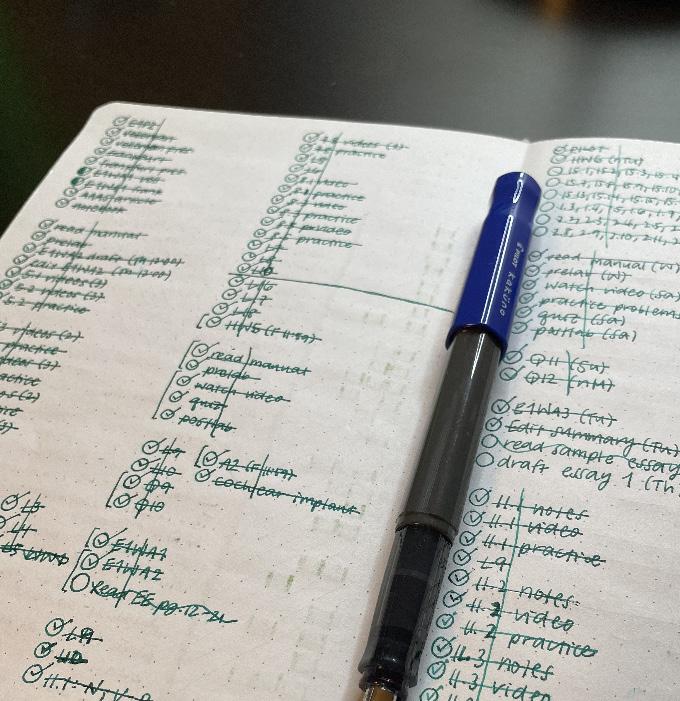
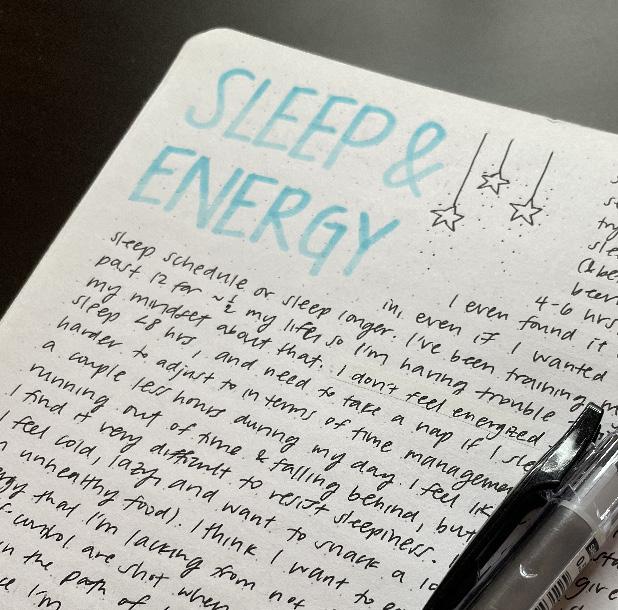
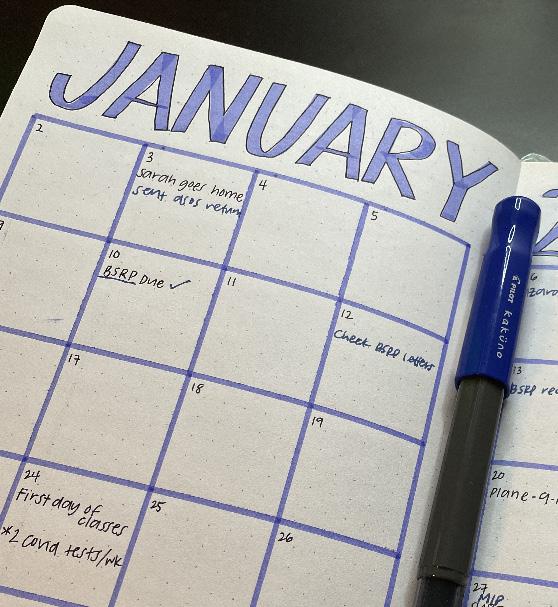 Rowan Liu
Rowan Liu
I've been journaling for over a decade now.
1. Find your medium.
2. You don't have to write every day. 3. Write about your surroundings. 4. Keep track of chronology.
5. Know your purpose.
6. Most importantly, have fun!
10
Your pathological niceness, your blood-boiling, vessel-rupturing anger
Charlene Huang, Social Media Manager ‘22-23
Here is a point of view:
You’re a woman — an excessively nice one because you’re scared of who you’ve become.
You’re frustrated because you wonder if you can actually trust your voice when you’re conditioned to be polite and passive, accommodating and yielding, when you’re taught to give rather than receive.
You don’t understand why you feel so compelled yourself to appease those who aren’t afraid to take. And boy, do they take.
You thought you needed this one thing — niceness — to feel complete and human, but this habit has only made you a plaything in someone else’s game.
You need a cure for this excessively-nice-girl pathology. So you...
1. Give yourself permission to prioritize yourself.
You wake up at 6 a.m. to run, because cardio is supposed to release endorphins, and endor phins are supposed to make you happy. You want to be content with who you are as a woman — an excessively nice one — so you run and run and run.
You do so much cardio that your knees hurt, your ankles ache and your lungs burn. But no matter how much your body burns, you still can’t slough an excess that won’t burn away so easily. So you decide to...
2. Set clear and healthy boundaries for yourself.
Because when you tell your therapist about your nice-girl trauma, you’re forced to recount the times your boundaries have been trespassed.
You talk about your self-justifying ex, Mr. Seattle, who may have had a successful internship at
on “Respecting Women 101.” You can’t stop thinking about his big, greedy hands forcing themselves on you and how your civility kept
to politeness. But you suppress your blood-boiling, vessel-rupturing anger because anger isn’t polite.
Anger isn’t womanly.
You become accustomed to silence — so much so that when you’re pushed to your breaking
you watched a part of you retreat to a dark and remote place.
You remember Mr. Pavlov, a long-limbed, long-haired man, who made unsolicited remarks about your “hourglass body,” who said you had a “nice body to cuddle with,” who, in a prison-like dorm room, forcibly grabbed your
clears, you go back to being excessively nice.
You notice a pattern: Those who don’t understand — or simply don’t respect — your boundaries, who don’t understand that your body is yours and in no way theirs. Never theirs.
Your passivity isn’t a gift. It has nothing to do with politeness and everything to do with
you obey as though it’s all you have worth giving. You’re so afraid of standing up for yourself that your niceness becomes pathological, compulsive
Slowly, you learn that in order to avoid being too nice, you must...
3. Stop engaging with people who don’t respect
you.
So you try. You cut ties with Mr. Seattle and Mr. Pavlov because you won’t make excuses for them. You’ll only hold space for those who actually respect you as a person.
But the weight of trauma is heavy like thunderclouds over your head.
You rage against the world at the ways you’re taught that silence is tantamount
When you walk on campus and see lawn signs that teach the meaning of consent, you feel more alone than ever. You want to cry because you’re reminded of Mr. Seattle and Mr. Pavlov. You wish someone told you this before. That saying no isn’t impolite. Refusing unwanted advances isn’t rude. Swallowing your discomfort to please
You do what you can do. You tell yourself that you can still be nice without being excessively nice. You educate yourself about consent. You’re learning about your boundaries and being respectful of others’ as well.
And you write.
You write for the people who have had their boundaries violated, their wishes overridden. You write to regain your agency, to tell yourself that your voice is permanent. You may have lost fragments of yourself, but you’re still valuable. You’re still whole and complete because your
by the very questionable company you’ve kept.
You realize your glow-up is a look in the mirror, an acknowledgment of who you are and the realization that you...
11
... are you... are You.
Don’t
The importance of getting a good night’s sleep
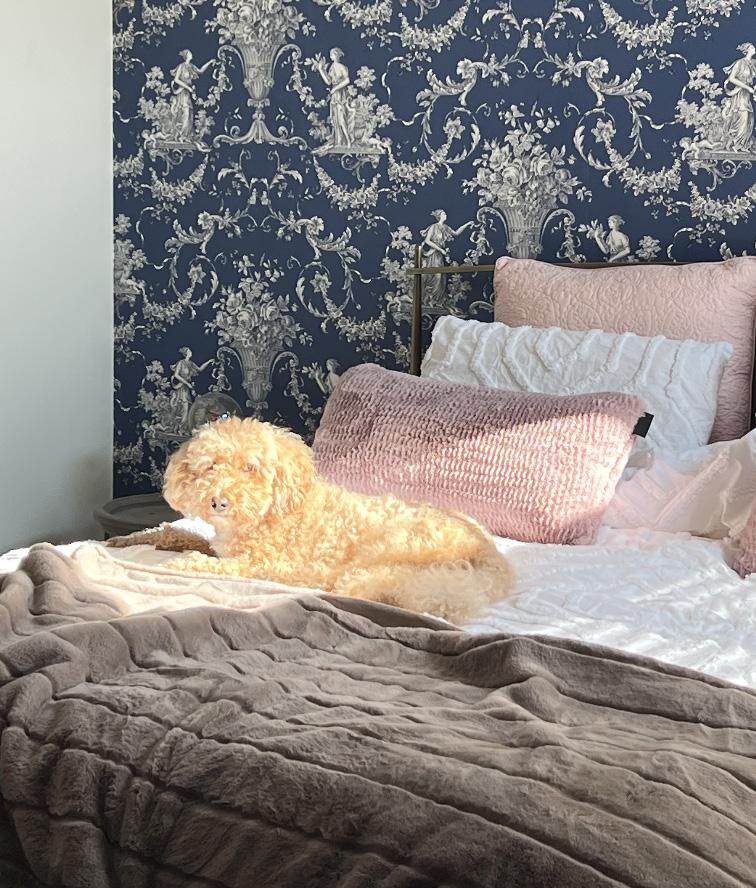 Tommy Song
Tommy Song
Everyone has heard the same old advice about getting eight hours of sleep every night. Parents say it. Teachers say it. Thousands of YouTubers say it. whether it’s a few midterms, a big essay or a friend's birthday. Some of us celebrate getting even six hours of sleep, but getting a consistent seven to
A little bit of science for you: A healthy amount of sleep features four to six sleep cycles, each including periods of deep sleep and rapid eye movement sleep, which is when we dream. This is a crucial period of time because this is when your brain processes new information you learned earlier in the day, consolidates it and chooses which pieces to delete. If your sleep quality is bad, these cognitive functions don’t get a chance to develop. Consequently, this
schedule. Here are a few steps to get you started:
1. Stick to a consistent sleep schedule. 2. Create a cozy sleeping environment. 3. Don’t take too many naps. 4. Manage your meals and caffeine intake.
eat a big meal or anything too heavy during the few hours
bed; food
only
to
5. Control stress levels and anxiety. 12
before
babies will
lead
indigestion and discomfort. Use caution
When I was younger, my grandmother would always give me skincare products to subtly remind me of the importance of taking care of my skin. Of course, as a child, I never took her advice seriously until I reached puberty and began to see the consequences of my ignorance.
conducting research, I soon developed a skincare routine that not and soothes my mind for the day.
As someone who is constantly rushing about, my skincare routine has become a small pocket of time for daily self care, something I start my day with after my morning workout and end my night with before bed.
Here are a few key steps in any skincare routine:
1. Cleanser
Washing your face is the bare minimum in skincare, and you cannot just use body soap. Finding the right cleanser depends on your skin’s needs, whether you have sensitive, dry or oily skin. The three main types of cleansers include gel, foam and cream cleansers; whichever kind you choose, make sure you are washing your face at least twice a day.
Current cleanser of choice: Clean & Clear Morning Burst Oil-Free Facial Cleanser
2. Toner
Current serum of choice: Ye Hwa Dam’s Plum Flower Revitalizing Serum
Current oils of choice: Trilogy Rosehip Oil Antioxidant+
4. Moisturizer
Keeping your skin soft and hydrated is the essential function of any moisturizer, but the type you choose will depend on your skin’s needs.
Current moisturizer of choice: The Face Shop’s Chia Seed Hydro Lotion
5. Sunblock
Before stepping outside, don’t forget to apply a lightweight sunscreen to protect your skin from the sun’s ultraviolet rays and prevent wrinkles and skin cancer.
Current sunblock of choice: Shiseido’s Clear Sunscreen Stick
How to step up your skincare game
Michelle Limpe, Editor in Chief ’22-23
The purpose of a toner is in its name: to tone by hydrating and balancing your skin. Just as you exercise to tone your body, making this a consistent step will produce better results. Choose a toner rich in antioxidants and nutrients to best prevent skin damage while brightening your face.
Current toner of choice: The Face Shop’s Green Natural Seed Antioxidant Toner
3. Serums and oils
serums are composed of smaller molecules, they penetrate deeper into a more general purpose of nourishing, protecting and hydrating your skin — they can even be used in place of a moisturizer.
purposes based on your skincare goals.
6. Facial massage
Massage your face with a gua sha in the morning and jade roller at
features, which also helps your skin absorb all of the serums, oils and nutrients better!
Additional steps in my nighttime skincare routine:
7. Eye Cream
revitalizing eye cream.
Current eye cream of choice: Nu Skin Tru Face Ideal Eyes
8. Lip Mask
Current lip mask of choice: LANEIGE Lip Sleeping Mask
Bonus: Do a face mask at least once a week!
With any routine, consistency is key! This list barely scratches the surface of skincare, and only you can decide the products that work best for you. But hopefully, this guide provides you with the essentials to help you get started on your journey toward healthy, glowing skin!
13
Returning to a childhood hobby: full gure eight
Maddy Kye

At age 20, I’ve often found myself falling into the belief that I am too old to learn something new — as if to be 20 is to be ancient — and turning away from opportunities.
People (myself included) often seem to think that it’s only worth putting time into something if it is going to have a glamorous payoff.

14
Photos courtesy of Maddy Kye
The dark side to glowing up
Sophia Park, Magazine Editor ’22-23
Lately, I have found myself in an unhealthy relationship with TikTok. It starts when I am about to fall asleep. All I can do is scroll and scroll, an endless pursuit that inevitably ends in sore eyes and lowered self-esteem.
My For You page seems to know me a little too well and is littered with “hot it-girl energy” videos. This translates to an assortment of workout routines, healthy recipes and clean makeup tutorials.
As an impressionable 21-year-old easily swayed by social media, these videos have been my demise. Every so often I will feel the need to “glow up,” to totally transform myself.
I will work out more often, tackling workouts that leave my body aching for days. I will eat cleaner, pushing aside my ramen cravings for salad bowls. I will change my makeup, replicating whatever natural makeup look I saw the night before on TikTok.
For a short while, this will work. I will see the tangible results of my But just when I think I have settled into my new self, I will have the shredded mozzarella and a crispy fried egg.
This seemingly harmless craving has the power to shatter every ounce of newfound self-confidence that had been built from the ashes of my previous glow-up.
So you may wonder, why would I do this? Why would I allow myself to cycle in self-loathing? To answer this, I don’t know. How can I keep letting myself succumb to the pitfalls of social media when I know its toxicity? This is the harm of glow-up culture.
There is something so appealing about bettering yourself. Who doesn’t want to become the best version of themself?
The whole concept of self-improvement is great but at what cost? We should want to better ourselves for the sake of ourselves only, but glow-up
The clean girl aesthetic embodies Eurocentric beauty standards and champions itself on promoting an ideal (yet expensive) lifestyle. The predominant icons of the clean girl aesthetic are typically Caucasian
actions carry so much weight. When she uses a certain brand of clothing, make-up, skincare — people follow suit. On Aug. 23, Bieber posted a TikTok where she wore brown lipliner and clear lip gloss and described this look as brownie-glazed lips. The issue with this is that it isn’t a new idea.
Women of color, especially those of darker skin tones, have been wearing this look for years, but now that Bieber does it, it’s a trend.
There are so many more issues with the clean girl aesthetic that multiple maintain this healthy lifestyle, the implications of what a “dirty girl” is and the new beauty and body standards it has created. The list goes on.
What I am trying to say is that with the rise of social media and the domination of the clean girl aesthetic, glowing up no longer feels like a thing one can do for themself, but something almost expected from them. We should want to improve ourselves for the sake of self-love and not to appeal to societal standards of what we are expected to look and feel like.
With this, as one of the editors of this magazine, I urge you to question yourself before embarking on a “glow-up.”
Set reasonable expectations. Rather than thinking, “I must gain abs by XYZ,” think “I just want to conquer my fear of the gym.”
one. Don’t be afraid to take time for yourself and take care of your own mental health.
damaging to one’s self-worth. As much as anyone else needs to hear this, I also need to listen to my own advice. Let’s all try to prioritize self-love
Currently in 2022, the clean girl aesthetic dominates glow-up culture. The issue is that the clean girl aesthetic is both unattainable and inaccessible to many.
Who are you doing this for? Why are you doing this?
15

Email managing@jhunewsletter.com and check out our website at www.jhunewsletter.com to get involved with The News-Letter.




 Maria Harar
Maria Harar

 Niva Savani
Niva Savani






 Rowan Liu
Rowan Liu
 Tommy Song
Tommy Song


